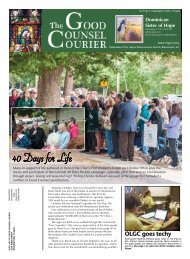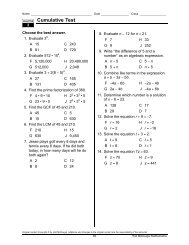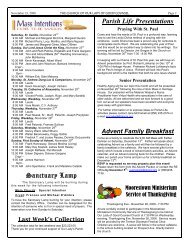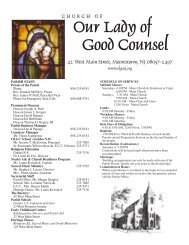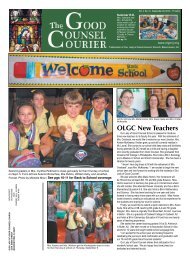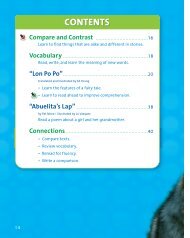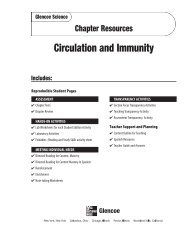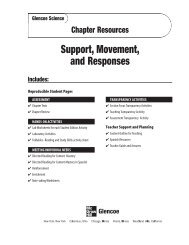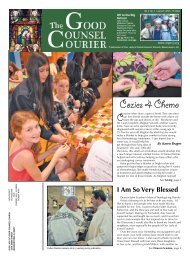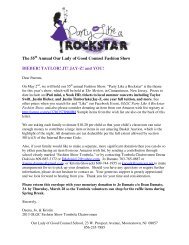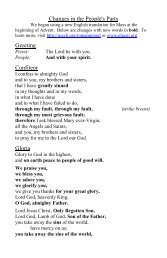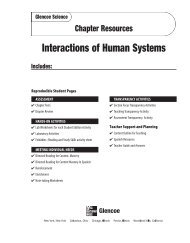Welcome Deacon Matthew Pfleger - Our Lady of Good Counsel
Welcome Deacon Matthew Pfleger - Our Lady of Good Counsel
Welcome Deacon Matthew Pfleger - Our Lady of Good Counsel
Create successful ePaper yourself
Turn your PDF publications into a flip-book with our unique Google optimized e-Paper software.
10 | The <strong>Good</strong> <strong>Counsel</strong> Courier Vol. 4 | Issue 2 | April 26, 2012<br />
www.olgcnj.org<br />
Freedom and the Resurrection<br />
By Father Jim O’Neill<br />
What is freedom Elements in society would have us believe that freedom<br />
is to do what we want. While that is an aspect <strong>of</strong> freedom, it is not enough and<br />
sometimes even detrimental to true freedom. We see a better, deeper, and truer<br />
answer in the Compendium to the Catechism <strong>of</strong> the Catholic Church, question<br />
#363.<br />
Freedom is the power given by God to act or not to act, to do this or to<br />
do that, and so to perform deliberate actions on one’s own responsibility.<br />
Freedom characterizes properly human acts. The more one does what is<br />
good, the freer one becomes. Freedom attains its proper perfection when<br />
it is directed toward God, the highest good and our beatitude. Freedom<br />
implies also the possibility <strong>of</strong> choosing between good and evil. The choice<br />
<strong>of</strong> evil is an abuse <strong>of</strong> freedom and leads to the slavery <strong>of</strong> sin.<br />
God the Father sent His Son to redeem us - to set us free from the slavery <strong>of</strong> sin<br />
so that we might experience the fullness <strong>of</strong> freedom, joy, peace, and love with Him<br />
in Heaven. We see this more clearly in the Resurrection stories we hear during<br />
the Easter season. Jesus appears to His disciples several times to forgive them,<br />
strengthen them, and commission them to proclaim Him to all the world. Jesus<br />
desires that all <strong>of</strong> us become freer, choose Him, and ultimately be with Him in<br />
Heaven.<br />
I recently heard about a survey regarding Heaven on the EWTN show, “Living<br />
Right with Dr. Ray.” People were asked to rank several celebrities on the likelihood<br />
that they would go to Heaven. Mother Teresa (who was living at the time) ranked<br />
first at 87%. They were also asked the likelihood that they themselves would go to<br />
Heaven. That came out to 92%. How could we as a society rate ourselves holier<br />
than Mother Teresa Dr. Ray <strong>of</strong>fered his idea that many in our society think that we<br />
can define what is good for ourselves.<br />
The reality is that God is the one who defines what is good. He is the ultimate<br />
good Himself. If we want to be truly happy and free, then we ought to seek out<br />
the ultimate good, the One who is already seeking us. He is ready to forgive us,<br />
strengthen us, and share His life with us. He already does so most especially in the<br />
Eucharist as preparation for seeing Him face to face.<br />
Prayer for the Protection <strong>of</strong> Religious Liberty<br />
O GOD OUR CREATOR,<br />
from your provident hand we have received<br />
our right to life, liberty, and the pursuit <strong>of</strong> happiness.<br />
You have called us as your people and given us<br />
the right and the duty to worship you, the only true God,<br />
and your Son, Jesus Christ.<br />
Through the power and working <strong>of</strong> your Holy Spirit,<br />
you call us to live out our faith in the midst <strong>of</strong> the world,<br />
bringing the light and the saving truth <strong>of</strong> the Gospel<br />
to every corner <strong>of</strong> society.<br />
We ask you to bless us<br />
in our vigilance for the gift <strong>of</strong> religious liberty.<br />
Give us the strength <strong>of</strong> mind and heart<br />
to readily defend our freedoms when they are threatened;<br />
give us courage in making our voices heard<br />
on behalf <strong>of</strong> the rights <strong>of</strong> your Church<br />
and the freedom <strong>of</strong> conscience <strong>of</strong> all people <strong>of</strong> faith.<br />
Grant, we pray, O heavenly Father,<br />
a clear and united voice to all your sons and daughters<br />
gathered in your Church<br />
in this decisive hour in the history <strong>of</strong> our nation,<br />
so that, with every trial withstood<br />
and every danger overcome—<br />
for the sake <strong>of</strong> our children, our grandchildren,<br />
and all who come after us—<br />
this great land will always be “one nation, under God,<br />
indivisible, with liberty and justice for all.”<br />
We ask this through Christ our Lord.<br />
Amen.<br />
THE BIBLE: Acts <strong>of</strong> the Apostles<br />
By Richard J. Lohkamp<br />
In the weeks following Easter, the<br />
first readings in the Sunday liturgy are<br />
selections from Acts. They are mostly<br />
excerpts from the early testimonies <strong>of</strong> eye<br />
witnesses to Jesus’ resurrection. While it<br />
is placed after the Gospel <strong>of</strong> John in the<br />
Bible, Acts is actually the second volume<br />
<strong>of</strong> a two volume work by Luke. The first<br />
volume is the Gospel according to Luke.<br />
Luke begins Acts as follows:<br />
“In the first book, Theophilus, I dealt<br />
with all that Jesus did and taught until<br />
the day he was taken up, after giving<br />
instructions through the Holy Spirit to<br />
the apostles whom he had chosen. He<br />
presented himself alive to them by many<br />
pro<strong>of</strong>s after He had suffered, appearing<br />
to them during forty days and speaking<br />
about the kingdom <strong>of</strong> God.”<br />
“While meeting with them, He<br />
enjoined them not to depart from<br />
Jerusalem, but to wait for ‘the promise <strong>of</strong><br />
the Father about which you have heard me speak’”<br />
“… you will receive power when the holy Spirit comes upon you, and<br />
you will be my witnesses in Jerusalem, throughout Judea and Samaria,<br />
and to the ends <strong>of</strong> the earth.’ ’When He had said this, as they were<br />
looking on, He was lifted up, and a cloud took him from their sight.”<br />
(Acts 1:1-9)<br />
After the account <strong>of</strong> the Holy Spirit’s coming, Acts is the story <strong>of</strong> Peter<br />
and Paul with cameo appearances <strong>of</strong> other Apostles (James, Philip). It<br />
provides a broad survey <strong>of</strong> the spread <strong>of</strong> “the Way” from Jerusalem where<br />
the eleven retreated after Jesus was taken up to Paul’s first imprisonment in<br />
Rome, the point at which the book abruptly ends.<br />
Acts chronicles Paul’s work – his visits<br />
to the churches that he started in Greece,<br />
Macedonia, and Asia Minor. When read<br />
in conjunction with his epistles (letters<br />
that he later wrote back to these churches)<br />
you can see how Paul’s thinking about<br />
Christ and the “Way <strong>of</strong> Christ” develops.<br />
Acts ends with Paul in prison in Rome<br />
(about 50 AD). Rome was considered the<br />
“ends <strong>of</strong> the earth” suggesting that Luke<br />
believed that Paul had fulfilled Christ’s<br />
commission to preach to the “ends <strong>of</strong> the<br />
earth.”<br />
Acts, then, is the story <strong>of</strong> how the<br />
Christian Way began as a “sect” <strong>of</strong><br />
Judaism with a small band <strong>of</strong> followers<br />
<strong>of</strong> Jesus in Jerusalem. The book tells how<br />
this small group learned by its uncanny<br />
experience what the “Way” really entails<br />
and that it was intended to be shared with<br />
other people who were not Jews and who<br />
did not have the Jewish heritage.<br />
Luke is very careful to point out that<br />
this “experience” and this learning process <strong>of</strong> the followers <strong>of</strong> Jesus is<br />
energized by the Holy Spirit, the Power from on high promised by Jesus.<br />
Through this Power, Jesus leads and guides the apostles and their fellow<br />
followers <strong>of</strong> Jesus. It is the power <strong>of</strong> the Spirit imparted by the risen Jesus<br />
that empowers their actions.<br />
If “Theophilus” is each one <strong>of</strong> us, then the promise <strong>of</strong> the Spirit is<br />
made to each <strong>of</strong> us, and the power exhibited in Acts is promised to each<br />
<strong>of</strong> us according to the role and vocation that we have. This Power and<br />
this learning through life experience are not reserved to the first century.<br />
People like Peter and Paul learned through prayer and honest, non-selfserving<br />
reflection to hear and to trust this Guide.



